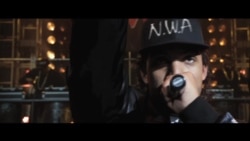Gangsta rap was born in a poor inner city neighborhood of Los Angeles, and grew up nourished by the often violent life on the streets and tense relationship with police there. The music expressed the black community's anger and emotions, and Gary Gray’s new movie, "Straight Outta Compton," chronicles the rise and fall of NWA, the group that revolutionized rap and hip hop in the 1980s.
Growing up in Compton was tough for O'Shea Jackson, an aspiring musician who took the stage name Ice Cube. He would write song lyrics on the school bus about his day.
There was the gangster who got on his bus and put a gun to a classmate’s head for challenging him from the bus window. He wrote about the cops who handcuffed him and threatened his parents because he happened to be at the wrong place the wrong time.
Gary Gray’s film shows Ice Cube teaming up with his buddies - Dre, a genius in music production, and Eazy–E, another charismatic performer, as well as MC Ren and DJ Yella - to create a Rap group. They called themselves NWA, an acronym for N*****z With Attitude. Their ‘in your face’ music and graphic lyrics about drugs, violence and poverty took the world by storm.
The filmmaker said he worked hard to keep the story as authentic as possible, actually filming in Compton.
“One of the most exciting things about making this movie was capturing a snapshot of American popular culture. So, I got the chance to put on my journalist hat and be a historian,” he said.
NWA was first discovered by music manager Jerry Heller, a big name in the 1960s and 70s, but in decline by the 80s, when he met NWA. Heller, portrayed by Paul Giamatti, was a controversial figure who nevertheless recognized the raw talent of the group.
Ice Cube, now a Hollywood mogul, and one of the film’s producers, remembers those times.
“You got to stand up. We took the music and it became our weapon,” he explained. “It was our only weapon. We didn’t pick up guns, we didn’t pick up sticks, bottles, you know, we picked up the mike and that was the way we fought back and at the end of the day, we’re still artists.”
Ice Cube’s son, O'Shea Jackson Jr., portrays him as a young man in the film.
Thinking about his father’s music, he said, “They talked about the things others were scared to talk about and shed light on things that people needed to know.”
But the way they talked prompted harsh public reaction outside of Compton. Reporters vilified them. The police had them under constant scrutiny. They even received a letter from the FBI, asking them to tone down their lyrics and threats against the police.
One scene in the film shows Ice Cube at a press conference talking about the group’s constitutional right to free speech. But those were harsh times and invoking the First Amendment was not that effective. The group’s members were repeatedly arrested and beaten up by police and by gangsters. "Straight Outta Compton" uses the Rodney King riots in Los Angeles in the early 90s as a backdrop for NWA’s concerts.
The film focuses on NWA's rise to fame, the relationship among its members, and how money, fame and greed destroyed that relationship and led to the break-up of the group.
But its scenes of police violence are especially hard-hitting, especially coming after recent events that led to the deaths of unarmed black men such as Michael Brown in Ferguson and Eric Garner in New York City at the hands of police.
"Straight Outta Compton" has attracted positive reviews for offering an authentic, honest and visceral portrayal of NWA and for expressing how it felt to grow up black, angry, and oppressed with no prospects in a poor neighborhood.









